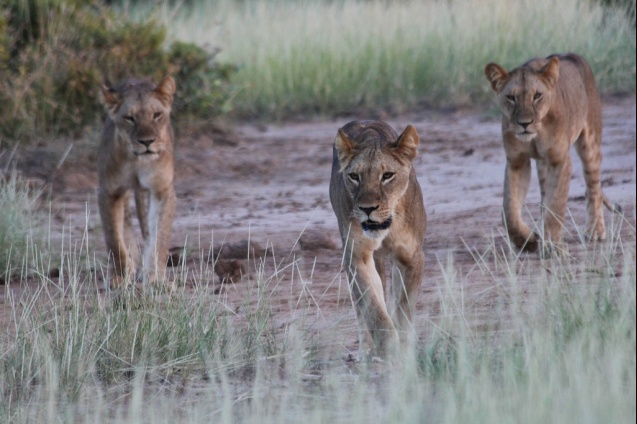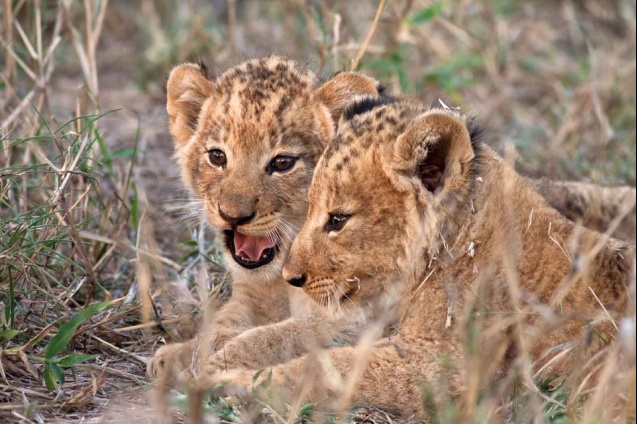The Predator Trap: the plight of ‘canned lions’ in Africa & how to help
The African lion conjures images of majestic white-maned predators ruling the savannah, the king of the beasts roaring loud or stalking its hapless prey in the tall grass. But for many lions in Africa, the reality is much less glamorous.
 Cub on the rock, lion in Africa by Tambako The Jaguar
Cub on the rock, lion in Africa by Tambako The Jaguar
Now rare in the wild, more than two-thirds of South African lions are reared as captive animals, many for trophy hunting, a nefarious practice opposed around most of the world.
Read on to find out more about 'canned lions' in Africa and what you can do to help them.
While some African lion cubs are bred ethically in legitimate conservation programmes, many others are severely mishandled. Many of these poor farmed lions are ultimately destined for paid hunting. Here, a ‘professional hunter’ with enough money can pay to shoot an impotent, purpose-bred young lion at a private game reserve or farm. He or she will then usually proudly pose next to the dead animal and claim its carcass as a trophy before its expired bones are exported for medicine in the Far East.
Canned African Lion Hunting
While the African lion is revered in most African cultures, they have been shot at, hunted, exploited and mistreated from Kenya to the Cape since colonial times. But in past decades, thanks to their low numbers (less than 20,000 African lions in the wild, with a 75% decline in populations overall) and strong conservation protections, private breeding facilities and ‘canned killing’ have emerged as a lucrative alternative, resulting in a small but powerful industry lobby group.
On canned hunting farms, young lions are ripped from their mothers as cute young cubs, mistreated and kept in tight enclosures until they are released into a larger compound, only to be cruelly gunned down or shot with an arrow while trapped in a baited cage. Throughout their short lives, they are often poorly fed and suffer high levels of stress – and they almost always end up pale and emaciated before meeting their unfortunate end.
Strong Opposition to Canned Lion Hunting
Ironically, given its proud natural heritage, strong efforts in sustainable tourism and its renown as a travel destination, with more than 200 farms South Africa is one of the places where this kind of canned hunting is the most problematic.
So widespread is the practice that a recent report by the South African Parliament’s Portfolio Committee on Environmental Affairs (PCEA) damned predator breeding and in particular lion breeding farms in the country. Encompassing an open forum for debate, the study brought together everyone strongly against this ‘hunting industry’ as well as its adamant backers.
Despite the protestations of the so-called ‘hunting industry’ supporters, the report concluded that predator breeding is unethical and mars the country’s tourism sector. Lion hunting in South Africa was also condemned for a litany of malpractices, including violating animal welfare laws, breaking moral and ethical codes, poor regulation, encouraging wild animal trafficking to replenish the gene pool, having little or no conservation value and playing a major contribution in tarnishing South Africa’s image internationally.
Unsurprisingly, supported by the likes of the Endangered Wildlife Trust and the Born Free Foundation, the Captive Breeding of Lions for Hunting and Lion Bone Trade report called for the practice to be reviewed – to end it as soon as possible.
Of course, those in support objected to South Africa’s own DEA (Department of Environmental Affairs) argument that the so-called industry, especially the lion breeding farms, is a sustainable model for using national resources and contributing jobs and tax revenue to the economy, a viewpoint predictably supported by the largest hunters associations in South Africa.
So, while several influential members of the South African government and society are pushing to scrap the practice of canned lion hunting and squash its sordid, greedy supporters, it remains to be seen which side will be victorious. Given the state of the country’s politics and finances, while it seems unlikely to change soon one can only hope – or even better take action (see below).
Thankfully, while the practice does exist in other parts of Africa, it is much less prevalent. Nevertheless, in Zimbabwe in 2015 an American hunter shot and killed a wild lion. His victim happened to be a collared alpha male called Cecil, famous as a tourist attraction in the country. When Cecil’s death was deemed by the Zimbabwe authorities to be a legal hunt, it caused an international uproar and more fortunately perhaps, focused much attention on the plight of his species around the world.
This resulted in a raft of new laws internationally and the emergence of a strong global movement to suppress it (the practice has been banned in several US states, for example).
But despite vocal activism in South Africa, canned lion hunting is also practised in Zimbabwe, Namibia, Tanzania and Botswana and several other Southern and East African countries.
The result is several million dollars in revenues for lion breeding farms every year and several thousand innocent slaughtered lions – both captive bred and from the wild – which activists argue is corrupt exploitation of a magnificent animal.
Ethical options for seeing lions in Africa
Fortunately, the rest of us would rather shoot a lion with a camera or simply watch them hunt their prey in their natural surroundings – without killing them at the end of the safari. Most visitors are looking for an ethical lion safari in Africa. So where are lions in Africa roaming freely?
Throughout Sub-Saharan Africa, there are several destinations where lions roam free. Here, you can witness the incredible, fearsome spectacle of a real-life African lion prowling, from Kenya, through Tanzania, Botswana and into South Africa itself – and be safe in the knowledge that your visit is not funding the destructive canned lion farming industry.
For more about African lions and tips for your lion safari in Africa, see our post on Lions in Africa.
African Budget Safaris offer several such tours, including a 7-day tour to Samburu, Lake Nakuru and Masai Mara in Kenya, one of the top safari destinations in Africa – home to an impressive abundance of wildlife, especially African big cats. The week-long Tarangire, Serengeti and Ngorongoro Tanzania Lodge Safari takes you to three of the best game parks on Tanzania's famous Northern Safari Circuit, where you can see the Big 5 and numerous predators such as leopards and lions.
 Samburu lions hunting by David Creighton
Samburu lions hunting by David Creighton
Further south, the 15-day Chobe, Moremi & Delta Botswana Camping Safari and 7-day Budget Delta Mokoro Trail & Savuti Safari, also in Botswana, offer travellers affordable opportunities to see lions in their natural habitat; while in South Africa, shorter options to do so include the 4-day Greater Kruger Lodge Safari to Timbavati Game Reserve and the 5-Day Kruger Park Bungalow and Sabi Sand Lodge Safari.
 Lion cubs in Kruger, South Africa
Lion cubs in Kruger, South Africa
What you can do to help captive lions in Africa
Aside from visiting only ethical operators, if you want to try to make a difference in the plight of the helpless canned lion in Africa, there are some further steps you can take:
Do some research. Find out more. Become disgusted by the canned lion industry and get motivated to do your bit.
Sign petitions to stop canned lion hunting. Such is the public outcry worldwide that there are several petitions against it at any given time. Find them and sign them.
- Donate to the Lion Recovery Fund that funds the Endangered Wildlife Trust's Great Limpopo Transfrontier Lion Conservation Project.
- Support Four Paws animal welfare organisation.
Donate to & volunteer at lion conservation projects
Support environmental organisations that focus on eradicating canned lion hunting and make the time to volunteer to help conserve this majestic king of the beasts.
- Donate to the Born Free Foundation
- Volunteer with Campaign Against Canned Hunting (CACH) at the Karro Wildlife Centre in South Africa or donate to CACH
 South African lion by richard evea
South African lion by richard evea
Budget African safaris that take you to see African lions in the wild include our Botswana Safaris, South Africa Safaris to Kruger, Tanzania Safaris, Kenya Safaris, Namibia Safaris and Zambia Safaris.
If you liked this post, these trips cover similar ground…
- 7 Day Samburu, Lake Nakuru & Masai Mara Safari in Kenya
- 5 Day Tanzania Safari - Serengeti, Ngorongoro & Tarangire
- Budget Okavango Delta & Savuti Safari in Botswana
- Greater Kruger Lodge Safari to Timbavati Game Reserve


 Namibian-born, Miles Masterson is a writer and editor from Cape Town, South Africa. Though usually working on copy, he can occasionally be found playing with his boys or riding an Atlantic wave. Like most surfers, Miles loves globetrotting; so much he sometimes doesn’t come back home for years. His favourite travel memory is witnessing up close a 45-minute, multi-species migratory stampede across Etosha Pan – a thousand thundering hooves rumbling over the parched ground like an animal earthquake. Unforgettable.
Namibian-born, Miles Masterson is a writer and editor from Cape Town, South Africa. Though usually working on copy, he can occasionally be found playing with his boys or riding an Atlantic wave. Like most surfers, Miles loves globetrotting; so much he sometimes doesn’t come back home for years. His favourite travel memory is witnessing up close a 45-minute, multi-species migratory stampede across Etosha Pan – a thousand thundering hooves rumbling over the parched ground like an animal earthquake. Unforgettable.











